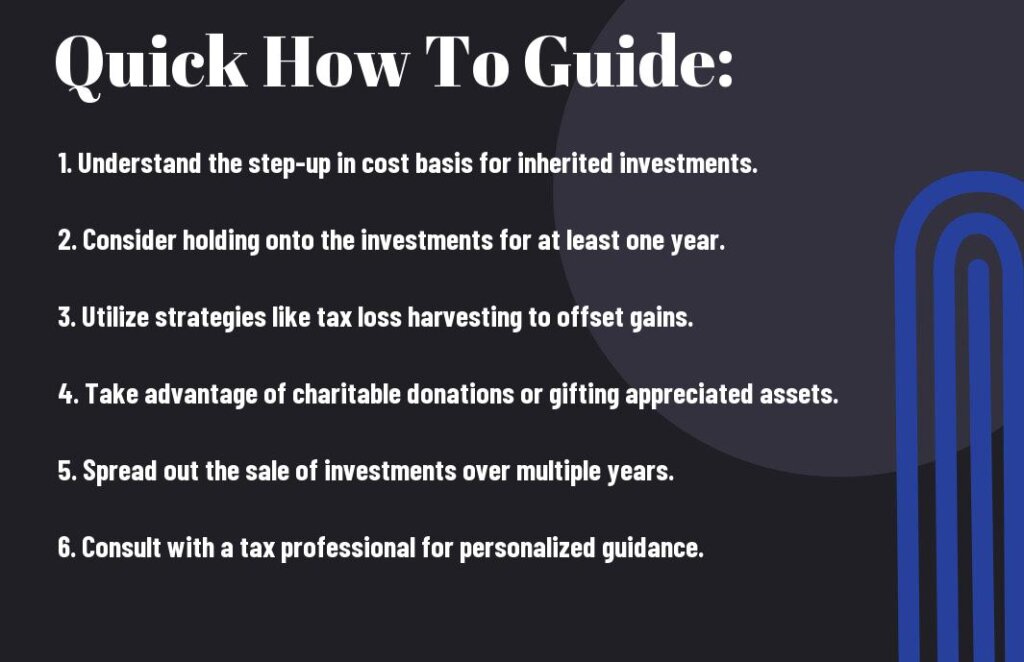This comprehensive guide will walk you through the strategies and tactics to reduce the impact of capital gains tax on inherited assets. By understanding the rules and utilizing smart planning, you can effectively preserve your wealth and maximize your financial legacy. Learn how to navigate the intricacies of capital gains tax on inherited investments with expert tips and advice in this informative blog post.
Key Takeaways:
- Step-up in basis: Take advantage of the “step-up in basis” that occurs when you inherit investments, which adjusts the value of the investment to its current market value at the time of inheritance, reducing potential capital gains tax.
- Consider holding period: Be mindful of the holding period of the inherited investments, as long-term holdings may qualify for lower capital gains tax rates compared to short-term holdings.
- Strategic selling: Strategically sell inherited investments over time to spread out any potential capital gains tax liability and take advantage of lower tax rates based on your income level and the length of time the investments were held.

Understanding Capital Gains Tax on Inherited Investments
Definition and Scope of Capital Gains Tax
Gains on inherited investments are subject to capital gains tax, which is a tax levied on the profit made from the sale of an asset. The tax is calculated based on the difference between the asset’s purchase price and its selling price. It’s important to understand how this tax works to effectively manage and minimize your tax liability on inherited investments.
The Role of Inheritance in Tax Allocation
An important aspect of inherited investments is how they are treated for tax purposes. When an heir inherits an investment, they receive a step-up in basis, which is the value of the investment at the time of inheritance. This step-up in basis can help minimize the capital gains tax liability that would have been owed if the heir had purchased the asset themselves.
This step-up in basis can be a valuable tax planning tool for minimizing capital gains tax on inherited investments. By understanding how inheritance impacts tax allocation, heirs can make informed decisions on when to sell inherited assets and potentially reduce their tax burden.
Factors Influencing Capital Gains Tax on Inherited Assets
Even though inheritance is generally not subject to income tax for the beneficiaries, capital gains tax may apply when inherited assets are sold. Several factors can affect the amount of capital gains tax owed on inherited investments:
- Value of the inherited assets
- Cost basis of the assets at the time of inheritance
- Length of time the assets were held before being inherited
- Any changes in value between the date of death and the date of sale
This can all impact the final tax liability when selling inherited investments.
Other Articles You Might Enjoy:
- How to Handle an Inherited Houston Property When There Is No Will
- The 4 Hidden Costs of an Inherited Houston Home (And How to Avoid Them)
- Inherited a Houston House with Your Siblings? 5 Tips to Navigate the Process
- Tax consequences when selling a house I inherited in Houston
- How to Price an Inherited Home in Houston: 3 Key Factors
The Basis Adjustment in Inherited Assets
Inherited assets usually receive a “step-up” in basis to the fair market value at the time of the original owner’s death. This adjustment can reduce the capital gains tax owed when the assets are sold.
Timeline Considerations for Selling Inherited Investments
An important factor to consider when selling inherited investments is the timeline. If assets are sold within a year of the original owner’s death, they may be subject to short-term capital gains tax rates. Waiting to sell after this period can result in lower tax rates for long-term capital gains.
As Realtor Darren Robertson explains, “This allows beneficiaries to potentially minimize the capital gains tax they owe on inherited investments by carefully planning the timing of sales.”

Why Sell Your House To TX Cash Home Buyers?
1. You Pay Zero Fees
2. Close Quickly or the date of your choice
3. Guaranteed Offer
4. No repairs required, we buy as is
5. Less Hassles!
Call Now (281) 595-7550 Send Text
Strategic Tips to Minimize Capital Gains Tax
Keep in mind these strategic tips to minimize capital gains tax on inherited investments:
- Consider holding onto the investment for at least one year to qualify for long-term capital gains tax rates.
- Explore tax-efficient investment strategies such as tax-loss harvesting to offset gains.
- Consult with a financial advisor to create a tax-efficient investment plan tailored to your situation.
Perceiving the implications of capital gains tax can help you make informed decisions.
How to Use Step-Up in Basis
With the step-up in basis, the value of inherited assets is adjusted to their current market value at the time of inheritance, potentially reducing capital gains tax when the assets are sold.
Tips for Timing the Sale of Inherited Investments
Tips for timing the sale of inherited investments include:
- Sell investments strategically to spread out capital gains over multiple tax years.
- Consider the impact of capital gains tax rates on your overall tax liability.
- Plan ahead to minimize tax consequences when selling inherited investments.
Perceiving the impact of timing on capital gains tax can help you optimize your financial outcome.
Plus
Recall, strategic planning and consulting with tax professionals can help you navigate the complexities of minimizing capital gains tax on inherited investments effectively.

Advanced Strategies and Considerations
Many advanced strategies can be employed to minimize capital gains tax on inherited investments. Here are some key considerations:
- Utilizing Trusts and Estate Planning
| Benefits | Considerations |
| Reduced tax liability | Complex legal requirements |
| Asset protection | Costs associated with setting up a trust |
Clearly, trusts and estate planning can offer significant advantages in minimizing capital gains tax on inherited investments. However, it is crucial to understand the potential complexities and costs involved in this strategy.
- Consult a Tax Professional: When and Why
| Timing | Importance |
| Before making any decisions | Expert advice can optimize tax savings |
| During major life events | Ensure compliance with tax laws |
Professional advice from a tax expert is crucial when dealing with inherited investments to navigate complex tax laws. Seeking guidance before making any decisions or during significant life events can ensure you maximize tax savings and remain compliant.
Plus, a tax professional can assist you in creating a personalized tax strategy tailored to your financial goals and unique circumstances. They can also provide ongoing support and guidance to help you navigate any tax implications related to your inherited investments.
Summing up
So, by following strategies such as stepping up the cost basis, utilizing charitable donations, spacing out asset sales, and considering tax-efficient investments, one can effectively minimize capital gains tax on inherited investments. It is crucial to plan ahead and seek advice from financial professionals to make the most of your inherited assets while minimizing tax liabilities.
FAQ
Q: What are capital gains taxes on inherited investments?
A: Capital gains taxes on inherited investments are taxes paid on the profits made from selling inherited assets such as stocks, bonds, real estate, or other investments.
Q: How can I minimize capital gains taxes on inherited investments?
A: You can minimize capital gains taxes on inherited investments by utilizing strategies such as step-up in basis, gifting, charitable donations, tax-loss harvesting, and investing in tax-efficient funds.
Q: What is a step-up in basis and how does it help in minimizing capital gains taxes on inherited investments?
A: A step-up in basis is the readjustment of the value of an inherited asset to its current market value at the time of the inheritance. This adjustment can help reduce the capital gains taxes owed when the asset is sold.
Q: Can I gift inherited investments to reduce capital gains taxes?
A: Yes, gifting inherited investments can be a strategy to reduce capital gains taxes. By gifting the investments to a lower-income family member or charity, you can potentially avoid capital gains taxes altogether.
Q: What are the benefits of investing in tax-efficient funds to minimize capital gains taxes on inherited investments?
A: Investing in tax-efficient funds can help minimize capital gains taxes on inherited investments by reducing the frequency of capital gains distributions, thereby lowering the taxable gains incurred by the investor.
Disclaimer:
The content provided on this blog is for informational purposes only. We are not attorneys or tax professionals. For personalized legal or tax advice, please consult with a qualified professional.
Written by Lisa Martinez, Founder of TX Cash Home Buyers

About The Company
TX Cash Home Buyers helps Texas homeowners sell quickly and simply — even in tough situations like repairs, inherited homes, or financial stress. Founded by Lisa Martinez, we’re known for our local experience, fair offers, and commitment to guiding sellers through off-market sales with clarity and care.




